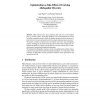Free Online Productivity Tools
i2Speak
i2Symbol
i2OCR
iTex2Img
iWeb2Print
iWeb2Shot
i2Type
iPdf2Split
iPdf2Merge
i2Bopomofo
i2Arabic
i2Style
i2Image
i2PDF
iLatex2Rtf
Sci2ools
PPSN
2000
Springer
2000
Springer
Optimization as Side-Effect of Evolving Allelopathic Diversity
Many bacteria carry gene complexes that code for a toxin-antidote pair, e.g. colicin systems. Such gene complexes can be advantageous for its host by killing competitor bacteria while the antidote protects the host. However, in order to evolve a novel and useful toxin first a proper antidote must be evolved. We present a model of bacteria that can express and evolve such allelopathic systems. Although in the model novel types must evolve from existing types we find that nevertheless in general a high diversity of toxins evolves and, as a sideeffect thereof, generalized immunity mechanisms. We interpret the allelopathic systems in terms of an optimization problem: fitness cases are toxins and solutions present (potential) antidotes. As a side-effect of the evolution of allelopathic systems generalized solutions of the optimization task are evolved as well.
Allelopathic Systems | Bacteria Carry Gene | Distributed And Parallel Computing | Gene Complexes | PPSN 2000 |
| Added | 25 Aug 2010 |
| Updated | 25 Aug 2010 |
| Type | Conference |
| Year | 2000 |
| Where | PPSN |
| Authors | Ludo Pagie, Paulien Hogeweg |
Comments (0)

